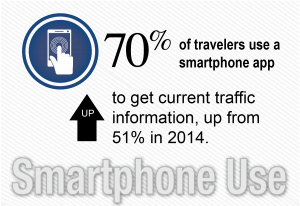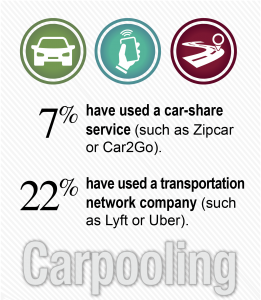Texans are relying more on information from smart phones and websites to make routine travel decisions than they did two years ago, according to new research from the Texas A&M Transportation Institute (TTI).
 According to the survey conducted this summer, 70 percent of respondents said they had recently used a smart phone app for navigation or route guidance, up from 51 percent in 2014. And 41 percent visited a website for traffic information or route planning, more than double the 18 percent from two years ago.
According to the survey conducted this summer, 70 percent of respondents said they had recently used a smart phone app for navigation or route guidance, up from 51 percent in 2014. And 41 percent visited a website for traffic information or route planning, more than double the 18 percent from two years ago.
Smart phone use and Internet use have been trending modestly upward for years, but researchers point out that the increased use specifically for daily travel planning by Texans is outpacing those broader trends, which could have implications in a number of ways.
“If drivers, for instance, are telling us in growing numbers how they want to get their traffic information, that compels us to consider how we’ve been providing that information up to now,” says Ginger Goodin, director of TTI’s Transportation Policy Research Center, which conducted the study.
The findings are among those from the 2016 Texas Transportation Poll, a statewide assessment of travel behaviors and attitudes conducted first by TTI in 2014. Repeating the first Texas Transportation Poll conducted in 2014, researchers surveyed more than 4,000 Texans aged 18 or older, posing questions in four areas:
- Travel behavior
- Travel solutions
- Transportation funding
- Customer satisfaction with governmental agencies
The Poll’s margin of error was plus or minus less than 2 percent.
Increased reliance on technology to avoid traffic was just one way in which Texans’ travel behaviors have changed in only two years. They were also more likely in 2016 to rely on their own vehicles for daily trips and less likely to use alternate transportation modes than they were two years earlier
Automobiles served as the primary transportation means for 93 percent of survey respondents this year, up slightly from 91 percent in 2014. Only 14 percent had made at least one trip in the previous month using public transit, compared with a quarter of respondents in 2014. Bicycle use dropped from 11 percent to 7 percent, and walking dropped from 33 percent to 30 percent.
Respondents also reported a 29 percent jump in the number of miles they drove, up from 13,351 two years ago to 17,321 this year. In 2014, 61 percent of respondents said they tried to travel less because of high fuel prices; but in 2016, only 29 percent reported traveling less for that reason.
More miles and more reliance on personal autos suggest a link between those travel choices and gas prices, which at the time of the recent survey were about two-thirds what they were in 2014.
“Our findings from the first poll two years ago confirmed the widely-held belief that Texans really depend on their cars and trucks,” says TTI Research Scientist Tina Geiselbrecht, a co-author of the study. “The follow-up study this year suggests that’s even more true when gas prices are taking a smaller bite out of their personal budgets.”
The share of Texans who believe transportation funding should be increased also was up, from 64 percent in 2014 to 73 percent this year.
Respondents this year also seemed slightly less familiar with the central source of transportation funding in Texas. Those who correctly identified the state’s fuel tax as a flat tax (remaining constant regardless of gas prices) was down from 51 percent to 46 percent. Those who incorrectly said it was a sales tax rose from 47 percent to 53 percent. 
New in this year’s survey was a series of question regarding transportation network companies (TNCs) like Uber and Lyft. Respondents generally believe that TNCs should be regulated at the state level, and that local governments should treat TNCs and taxi companies similarly.
“The question of how TNCs are regulated is driving a lot of robust discussion involving both travelers and policy makers,” according to Chris Simek, a TTI assistant research scientist and co-author of the Poll report. “We hope that our work can help to inform those discussions.”
Researchers plan to repeat the survey again in 2018 to monitor changes in Texans’ travel behaviors and opinions.
The full survey report, along with a summary for each region of the state, can be found online at https://policy.tti.tamu.edu/texas-transportation-poll/